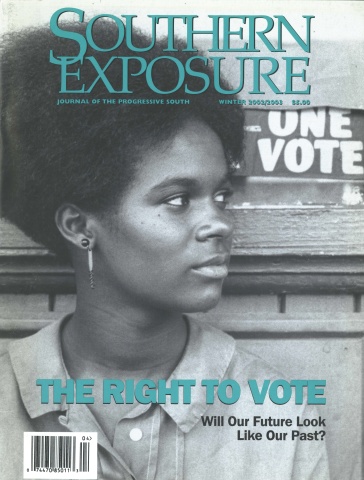5 Things You Can Do to Protect Your Right to Vote

This article first appeared in Southern Exposure Vol. 30 No. 4, "The Right to Vote." Find more from that issue here.
1. Check Your Records
If you’ve registered to vote, you should have no problems casting a ballot come election day, right? Wrong. In 2000, problems with voter records kept 1.3 million registered citizens from voting. Troubles with voter rolls threaten to be even worse now, as several states go through redistricting and others work out the glitches of new electronic registration systems. Be proactive: call your local board of elections and make sure they have the right information about you, what polling location and district you will be voting in, and who will be on the ballot.
2. Know Your Rights
Find out the laws in your state that guarantee the right to vote. For example, in many states, if you have registered to vote yet your name doesn’t appear on the rolls on election day, you have the right to cast a provisional ballot. Other standards are in place to ensure access to the polls for voters who speak English as a second language or have physical disabilities. People For the American Way has compiled a “Voter’s Bill of Rights” for over a dozen states (visit www.pfaw.org). Distribute copies to your church or community group, or pass it out to voters on election day.
3. Conduct a “Citizen’s Audit”
Most elections in this country are run by local election boards with small staffs, inadequate training, and shoestring budgets. Doug Lewis, director of the non-partisan Election Center in Houston, Texas, estimates that in 75% of the country’s 6,000 jurisdictions, elections are the least well-funded arm of government. Concerned citizens and grassroots groups can become voting sentinels by performing a “citizen’s audit” — an inventory of what election systems are in place, what improvements need to be made, and what resources are needed to get there. (See “Election Investigation,” next page.) If there isn’t a group yet working to improve elections in your county, form one.
4. Lend a Hand
Most areas are desperate for poll workers. In 2000, over 1.4 million poll workers were recruited to help administer elections. The vast majority received little training, worked 14 or more hours on election day, and received little or no pay for their effort. Yet conscientious poll workers are critical to the smooth functioning of our election system. Contact your local election board and volunteer to staff the polls — chances are, your help is sorely needed.
5. Do Election Protection
The best way to safeguard voter rights on election day is to organize “election protection” teams — people who fan out to polling precincts and advise voters of their rights, help voters assert those rights, and offer access to legal assistance. People For the American Way launched an election protection program in 2001, dispatching thousands of volunteers to monitor precincts in Virginia and New Jersey and helping hundreds of voters troubleshoot obstacles. If you want to set up an election protection program in your area, contact the Southern Voting Rights Project of the Institute for Southern Studies (publisher of Southern Exposure) at melissa@southernstudies.org and (919) 419-8311 x25 or visit the People For the American Way website listed above.
Tags
Melissa Siebert
Melissa Siebert is director of the Institute’s Southern Voting Rights Project (2003)
Stan Goff
Stan Goff is an associate of the Institute's Southern Voting Rights Project (2003)
Chris Kromm
Chris Kromm is executive director of the Institute for Southern Studies and publisher of the Institute's online magazine, Facing South.
